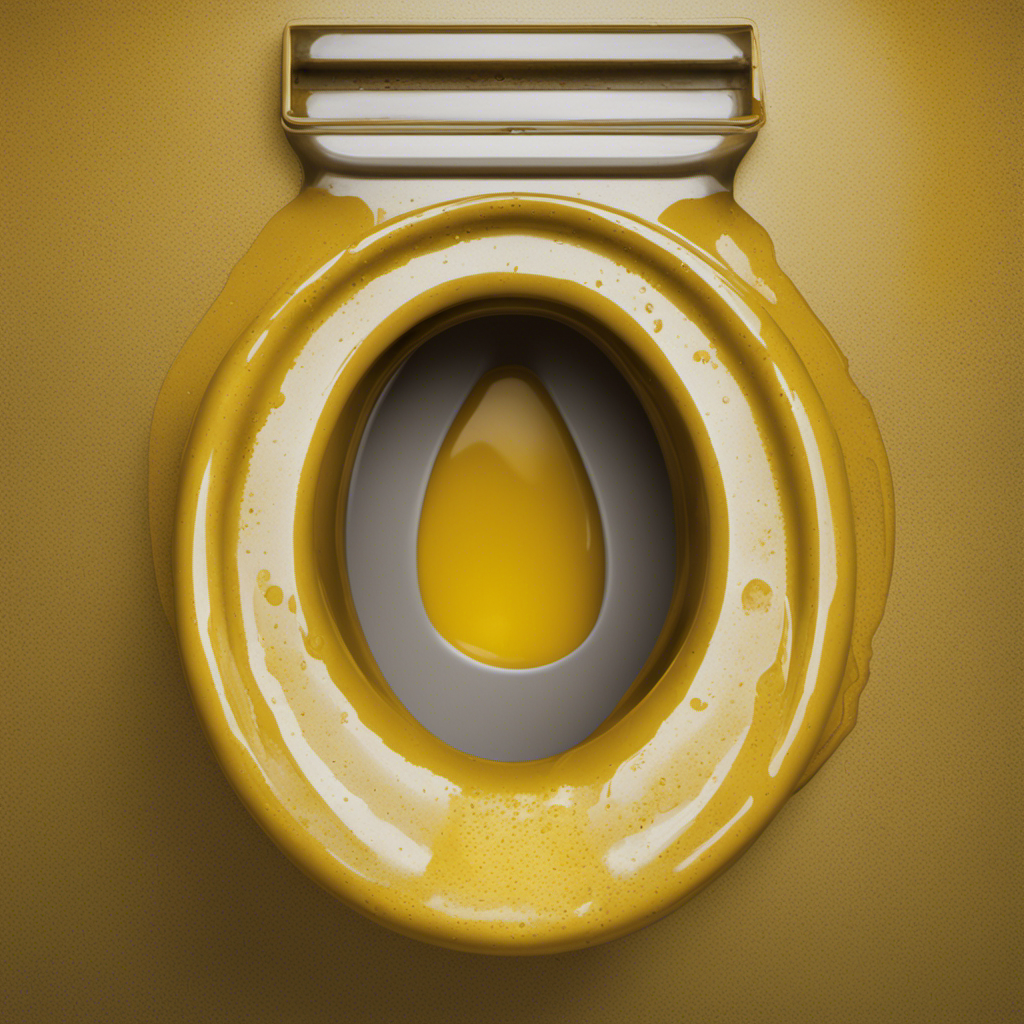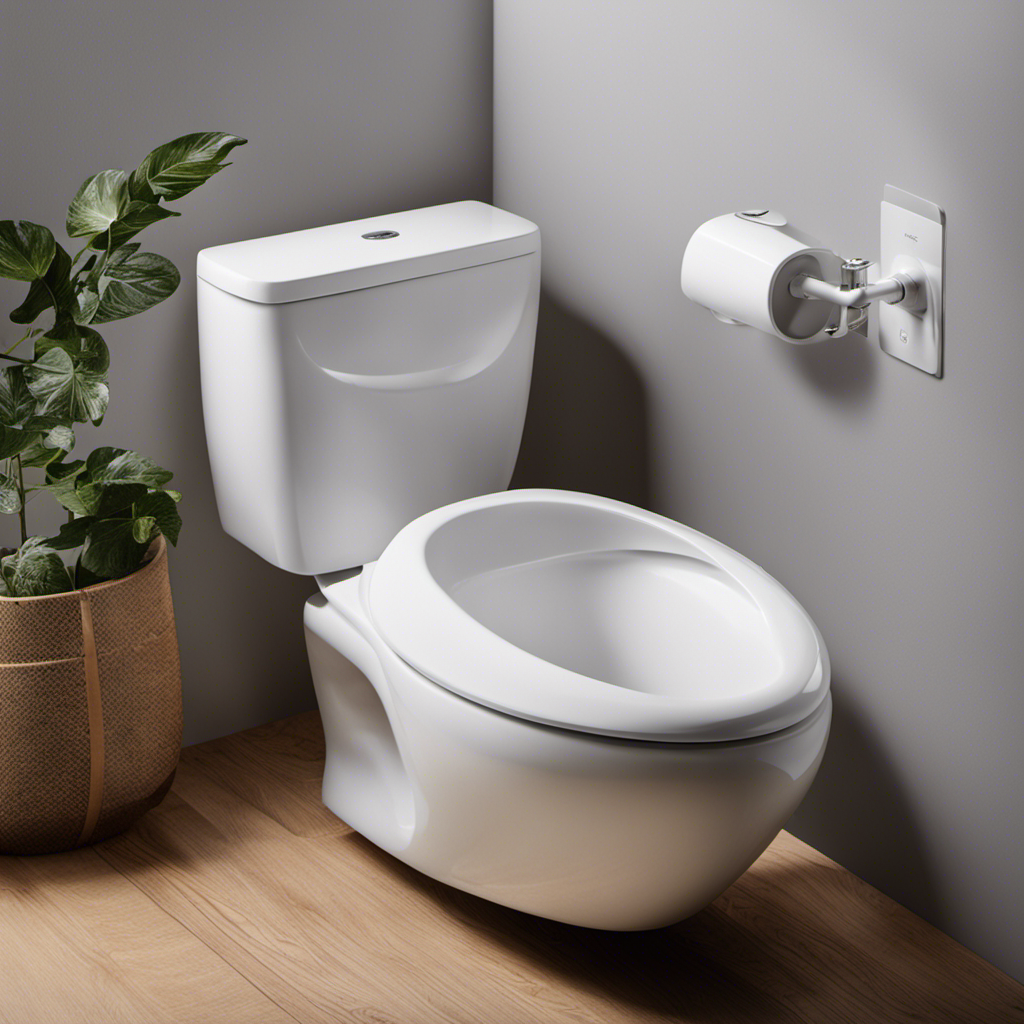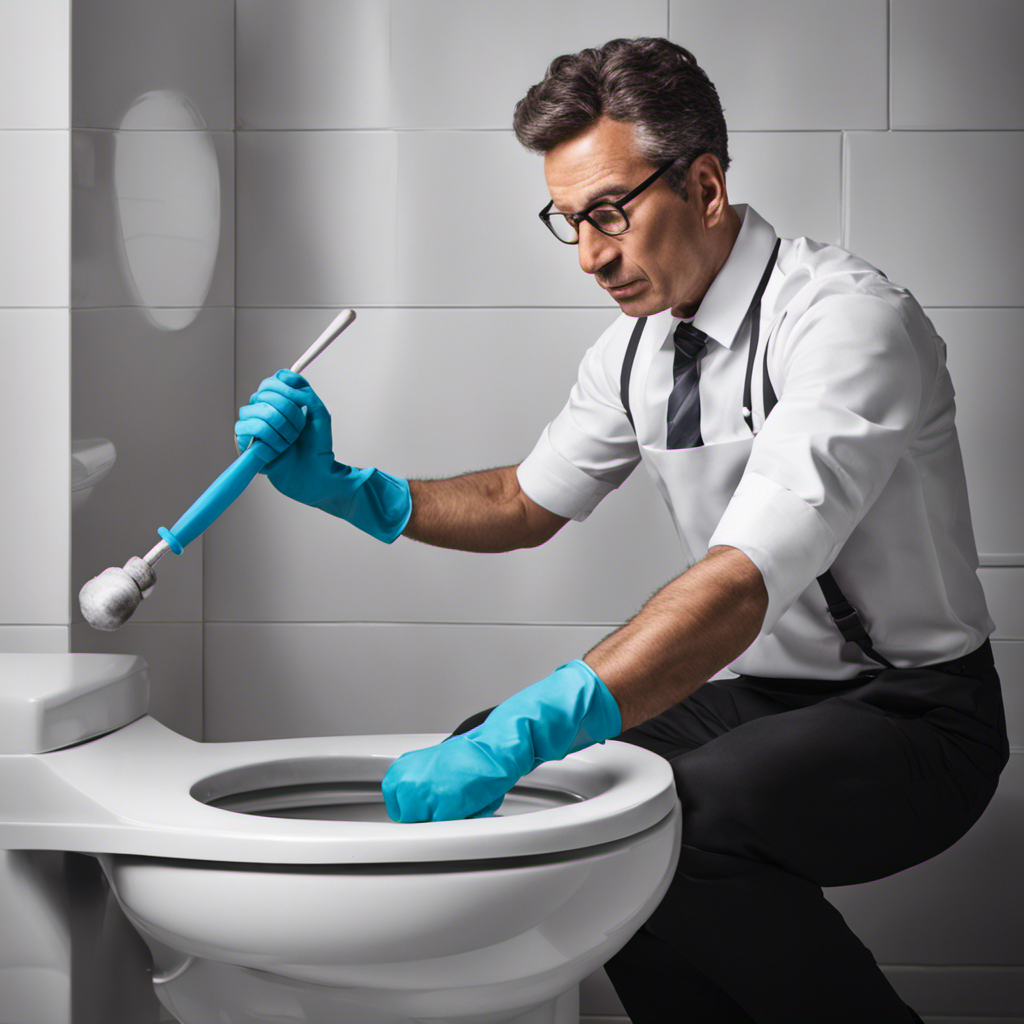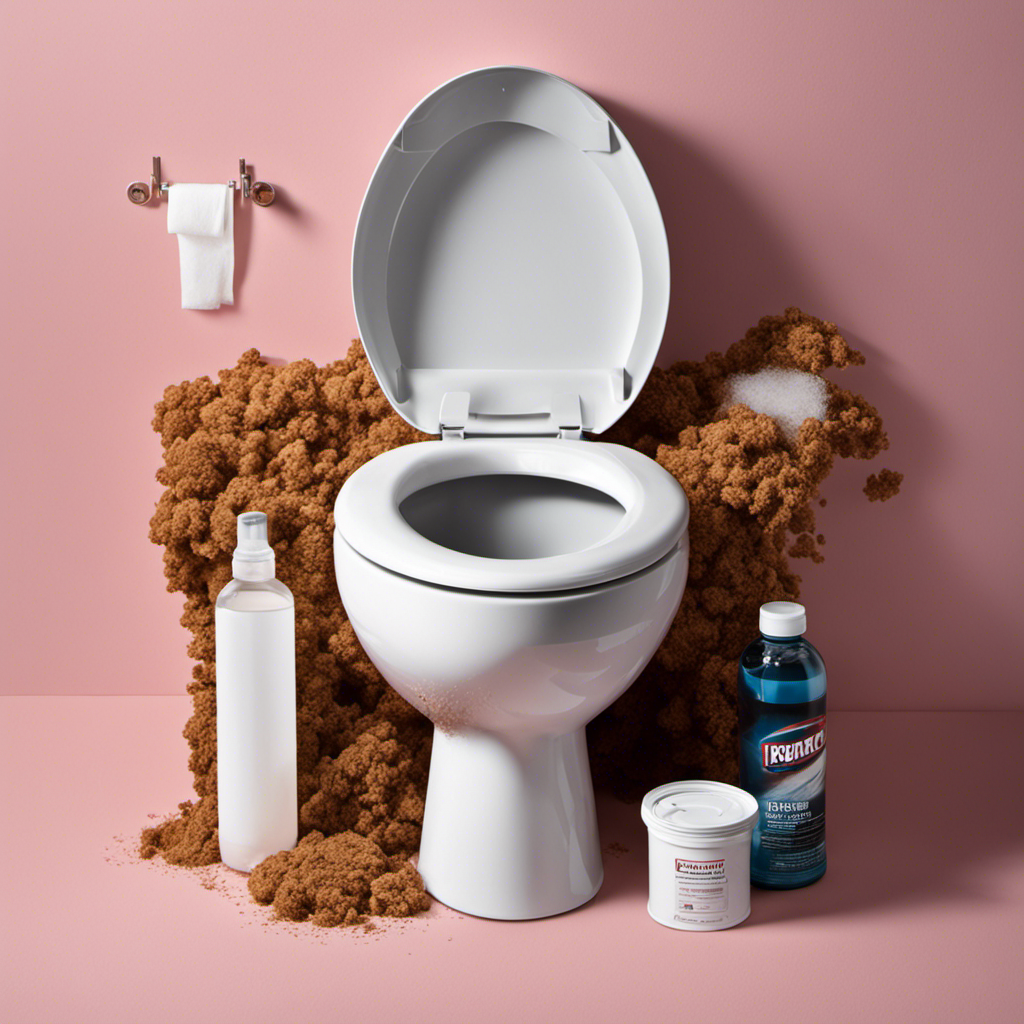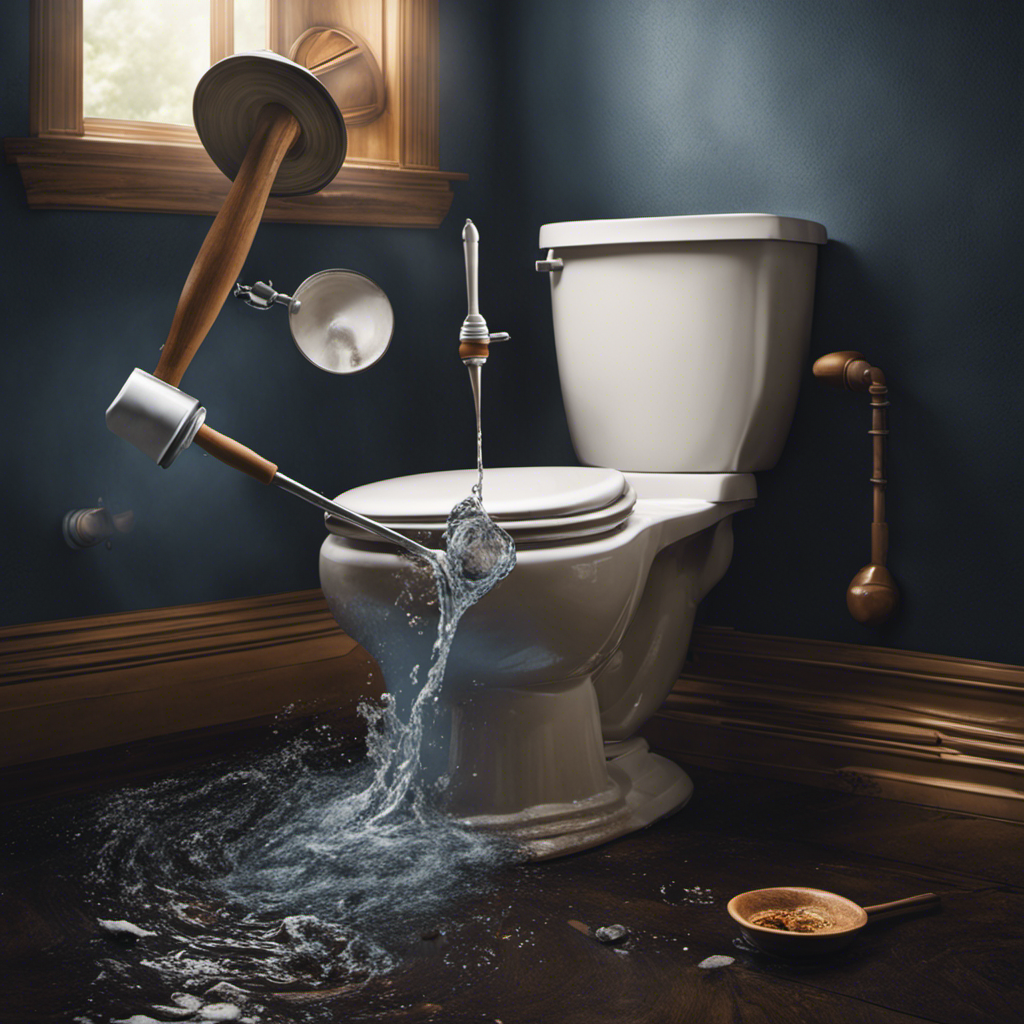As someone who has experienced the unpleasant odor of urine in their toilet, I understand the frustration it can cause.
Did you know that 80% of toilets develop a urine smell at some point?
In this article, I will delve into the common causes of this issue and provide you with effective solutions.
By understanding the role of bacteria, the impact of hard water, and the importance of proper cleaning and maintenance, you’ll be able to eliminate that persistent urine smell once and for all.
Key Takeaways
- Improper cleaning can lead to bacterial growth and urine odor in toilets.
- Bacteria break down urine and release foul-smelling compounds like ammonia, contributing to toilet odor.
- Hard water mixed with urine can create an unpleasant smell due to mineral deposits, and addressing hard water stains helps eliminate urine smell in toilets.
- Proper ventilation is crucial in preventing bathroom urine smells, and installing a ventilation system offers a long-term solution for odor control.
Common Causes of Urine Odor in Toilets
If your toilet smells like urine, it’s likely due to a few common causes. Understanding bacterial growth is crucial in eliminating urine odor.
One common cause is improper cleaning. When urine is not cleaned properly, it can accumulate and promote the growth of bacteria.
Another cause may be a faulty wax ring seal. If the seal around the base of the toilet is damaged or worn out, it can allow urine to seep into the floor and create a persistent odor.
Additionally, a leaky toilet can also be a culprit. A small leak in the toilet tank or bowl can lead to the growth of bacteria and the release of urine odor.
By addressing these common causes, you can effectively eliminate urine odor in your toilet.
Now, let’s delve into understanding the role of bacteria in toilet odor.
Understanding the Role of Bacteria in Toilet Odor
To understand the role of bacteria in that unpleasant odor, you can try cleaning the toilet regularly and using a disinfectant. Bacteria play a significant role in toilet odor, particularly when it smells like urine.
The bathroom is a breeding ground for bacteria due to the warm, damp environment. When urine comes into contact with the toilet bowl, bacteria break it down and release foul-smelling compounds like ammonia. This is why proper bathroom hygiene is crucial in preventing odor.
Regularly cleaning the toilet with a disinfectant will help kill the bacteria and reduce the odor. Additionally, it’s important to clean the surrounding areas, such as the floor and walls, to ensure that bacteria don’t spread and contribute to the unpleasant smell.
How Hard Water Can Contribute to Urine Smell in Toilets
When hard water mixes with urine in your toilet, it can contribute to an unpleasant smell. This occurs due to the presence of mineral deposits, such as calcium and magnesium, found in hard water. These minerals can react with the components of urine, creating a potent odor that lingers in the toilet bowl.
To address this issue, here are three effective methods for removing hard water stains and mineral deposits:
-
Vinegar and Baking Soda: Mix equal parts of vinegar and baking soda to create a paste. Apply the paste to the stained areas and scrub gently with a toilet brush. Rinse thoroughly with water.
-
Lemon Juice: Squeeze fresh lemon juice onto the stains and let it sit for a few minutes. Scrub the stains with a toilet brush and rinse with water.
-
Commercial Cleaners: Use a commercial cleaner specifically formulated to remove hard water stains. Follow the instructions on the packaging for best results.
Overcoming Urine Odor From Poor Ventilation in Bathrooms
When it comes to addressing urine odor in bathrooms, proper ventilation is crucial. Without adequate airflow, lingering smells can become a persistent problem.
In this discussion, I will explore effective ventilation solutions that can help prevent bathroom urine smells and maintain a fresh and odor-free environment.
Ventilation Solutions for Odor
One solution for reducing the odor in your toilet is by installing a ventilation system. A ventilation system helps to remove stale air and circulate fresh air, preventing the buildup of unpleasant odors.
Here are three benefits of installing a ventilation system in your bathroom:
-
Improved air quality: A ventilation system helps to remove odors, moisture, and pollutants from the air, resulting in a fresher and healthier environment.
-
Odor control: By continuously extracting air from the bathroom and replacing it with fresh air, a ventilation system helps to eliminate unpleasant odors, including urine smells.
-
Reduced humidity: Excess moisture in the bathroom can lead to mold and mildew growth, which can contribute to unpleasant odors. A ventilation system helps to reduce humidity levels, preventing these issues.
While air fresheners can provide temporary relief, a ventilation system offers a more effective and long-term solution for reducing toilet odors.
Preventing Bathroom Urine Smells
If you want to prevent bathroom urine smells, installing a ventilation system is a great solution. Proper ventilation is crucial in maintaining good bathroom hygiene and preventing unpleasant odors. A well-ventilated bathroom helps to remove moisture and airborne particles that can contribute to the development of bathroom odor.
Here are some hygiene tips to prevent bathroom urine smells:
| Hygiene Tips | Benefits |
|---|---|
| Clean the toilet regularly | Removes urine residue and prevents odor buildup |
| Use toilet cleaners with disinfectant properties | Kills bacteria that can cause urine smells |
| Keep the bathroom dry | Moisture promotes bacterial growth and odor |
| Use air fresheners or deodorizers | Masks any remaining odors |
Following these tips and ensuring proper ventilation will help keep your bathroom smelling fresh and clean. Remember, good hygiene practices are key to maintaining a pleasant bathroom environment.
Tips for Proper Cleaning and Maintenance to Eliminate Toilet Odor
When it comes to eliminating toilet odor, proper cleaning and maintenance are essential.
Firstly, it is important to establish a regular cleaning frequency and technique to keep the toilet clean and odor-free.
Secondly, potential plumbing issues such as clogs or leaks should be addressed promptly to prevent any lingering odors.
Lastly, using odor-neutralizing products can help to eliminate any remaining odors and keep the toilet smelling fresh.
Cleaning Frequency and Technique
To prevent your toilet from smelling like urine, make sure you’re cleaning it regularly and using the proper cleaning techniques. Here are three important things to keep in mind when it comes to cleaning your toilet:
-
Use the right cleaning products: Choose a toilet cleaner specifically designed to eliminate odor and kill bacteria. Look for products that contain ingredients like bleach or hydrogen peroxide, as they are effective in removing urine smells.
-
Scrub thoroughly: Don’t just quickly wipe the surface of the toilet bowl. Take the time to scrub it using a toilet brush, paying special attention to the areas under the rim and around the edges. This will help remove any urine residue and prevent future odors.
-
Clean the toilet tank and seat: Remember to clean not only the bowl but also the tank and seat. These areas can accumulate bacteria and contribute to the urine smell. Use a disinfectant cleaner and a cloth to wipe them down regularly.
Potential Plumbing Issues
While maintaining proper cleaning habits is important, sometimes a foul urine smell in the toilet can indicate potential plumbing issues.
It’s crucial to be aware of the signs of a faulty toilet to address any underlying problems promptly. One common issue is a faulty wax ring, which seals the toilet to the floor. If this wax ring becomes worn or damaged, it can allow odors to escape.
Another potential cause is a malfunctioning vent pipe, which helps regulate air pressure in the plumbing system. If the vent pipe is blocked or damaged, it can lead to unpleasant odors.
Additionally, a cracked or damaged toilet bowl can also result in a persistent urine smell. If any of these signs are present, it may be necessary to call a professional plumber for repairs to eliminate the odor and ensure your toilet functions properly.
Odor-Neutralizing Products
Using odor-neutralizing products in your bathroom can help eliminate any unpleasant smells and keep the space fresh. Here are three natural remedies that can effectively control toilet odor:
-
Baking soda: Sprinkle a generous amount of baking soda into the toilet bowl and let it sit for a few minutes before flushing. Baking soda helps absorb and neutralize odors, leaving your toilet smelling fresh.
-
Vinegar: Fill a spray bottle with equal parts water and vinegar. Spray the mixture around the toilet bowl, seat, and floor to eliminate odors. Vinegar has natural antibacterial properties that can kill odor-causing bacteria.
-
Essential oils: Add a few drops of your favorite essential oil, such as lemon or lavender, to the inside of the toilet paper roll. As the toilet paper is used, the scent will be released, helping to mask any unpleasant odors.
Addressing Plumbing Issues That Cause Urine Smell in Toilets
You might want to check if there are any plumbing issues causing the urine smell in your toilet. Sometimes, a foul odor can be a result of a problem within the plumbing system. It’s important to address these issues promptly to eliminate the smell and ensure proper functioning of your toilet.
| Common Plumbing Issues | Possible Causes |
|---|---|
| Clogged Drain | Build-up of debris or foreign objects in the pipes. |
| Leaking Wax Ring | Damaged or worn-out wax ring that seals the toilet to the floor. |
| Cracked Toilet Bowl | A crack in the porcelain of the toilet bowl, allowing odors to escape. |
| Ventilation Problems | Inadequate or blocked vent pipes, causing sewer gases to accumulate. |
| Faulty Flapper | A worn-out flapper valve that doesn’t seal properly, allowing odors to escape. |
Regular cleaning plays a crucial role in preventing urine smell in toilets. Using a toilet bowl cleaner and brush to scrub the bowl regularly can help remove any residue that may contribute to the odor. Additionally, the impact of diet on urine smell should not be overlooked. Certain foods and beverages, such as asparagus or coffee, can cause a stronger urine odor. Staying hydrated and maintaining a balanced diet can help minimize any strong smells in the toilet.
Conclusion
After exploring the common causes of urine odor in toilets, it’s clear that there are many factors that can contribute to a smelly toilet. Understanding the role of bacteria and the impact of hard water is important in addressing this issue. Overcoming poor ventilation and implementing proper cleaning and maintenance are also crucial steps. By addressing plumbing issues, we can eliminate the urine smell and create a fresh and pleasant bathroom environment.
Remember, keeping your toilet clean and well-maintained is essential for a hygienic and odor-free experience. Don’t let the smell linger, take action today!
